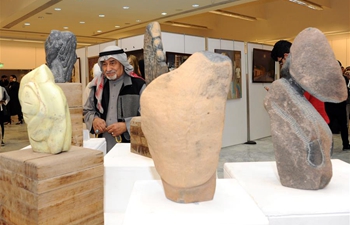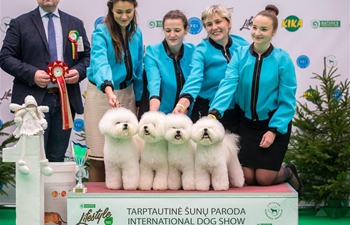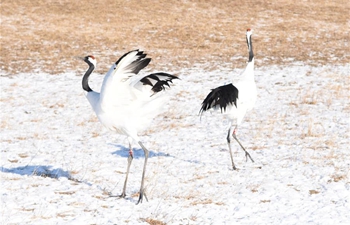BEIJING, Dec. 24 (Xinhua) -- On Nov. 21, 1985, Nature, the internationally-acclaimed weekly science journal, made its cover story "Science in China."
In the story, the bike-parking problem outside the main building in Tsinghua University provided an interesting introduction to the booming science being harnessed to China's ambitious social and economic goals.
On Aug. 1, 2019, cycling in Tsinghua was again highlighted in Nature's cover story. A hybrid artificial intelligence (AI) chip named Tianjic enables a bike to not only balance itself but steer itself around obstacles, respond to voice commands and even make independent decisions.
In recent years, China's scientific progress has been featured as special reports and research articles on the covers of respected international journals, providing a special perspective on the country's science and technology development.
China's contribution to global research output had grown impressively over the years, Nature editor-in-chief Magdalena Skipper said in an interview with Xinhua, adding that its contribution had not been limited to the number of publications.
"We have also seen an important increase in high-quality output, both in terms of impact and influence of the research in question, but also in terms of the rigor with which the work has been carried out," said Skipper.
Nature Index, which tracks contributions to research articles published in 82 natural science journals, is taken as an indicator of global high-quality research output and collaboration.
Nature Index 2019 shows China is the world's second largest contributor to high-quality scientific research papers.
China and Australia were the only two countries in the top 10 that have seen an increase in research output, with China rising by 17 percent compared with 2018.
The quality of research from China has been increasingly impressive in recent years, in many research areas, said Jeremy Berg, who returned to a research post in October after being Science's editor-in-chief.
Stem-cell biologist Zhou Qi is no stranger to Nature and Science.
On July 24, 2008, with a picture of the "Bird's Nest" National Stadium, China's growing strength in science was in the spotlight in Nature's cover story.
Zhou, then assistant director of the Institute of Zoology, the Chinese Academy of Sciences (CAS), was featured in a story about him participating in the Beijing Olympic torch relay.
The issue highlighted China's space exploration, clean coal technology, public health and international cooperation in science and technology, saying the country will find a prominent role among a more diverse global research community.
This September, Zhou, as director of the Institute of Zoology, hosted a CAS open house event for foreign reporters.
"I don't believe that science can only be done on a large and luxurious platform. Scientific research is mainly about people and their ideas," Zhou said.
Since 2008, Zhou and his colleagues have proved the pluripotency of iPS cells, bred mice from two females and built China's first clinical embryonic stem cell bank, making innovation a fixture of their careers.
In 2019, researchers from the Institute of Zoology reported in Science that they had grown monkey embryos in a lab for a record 20 days, providing insights into a crucial early stage in primate embryo development.
Researchers from other Chinese institutions also made groundbreaking achievements this year, such as the first use of gene-editing tool to try to cure a patient's HIV infection, first three-dimensional structure of African swine fever virus and first observation of parity-time symmetry in quantum research.
"The scientific research that can really go far must be based on independent innovation," Zhou told reporters at the CAS event. "Our plan for the future is still to do challenging work and keep the courage to explore the unknown."

















